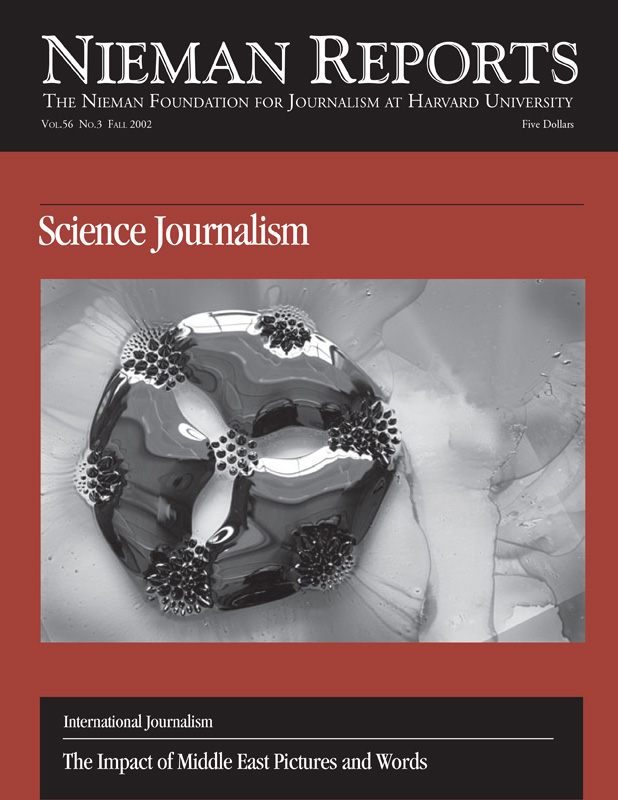At the final dinner for the Nieman class of 2002, a ceremony was held to honor the memory of Richard Harwood, Nieman Fellow class of 1956, whose family donated his library to Lippmann House after his death more than a year ago. The 223 books that make up the Harwood collection will be incorporated into the Bill Kovach Library.
The evening featured guest speakers who worked with Harwood over the years: Michael Getler, Washington Post ombudsman; David Maraniss, Washington Post national news reporter, and me. We shared with the outgoing class of Nieman Fellows stories that, we hoped, described the man who had such a lasting and profound effect on our lives as journalists.
I first met Harwood, as we always called him, in the mid-70’s when he ran The (Trenton) Times, a sleepy newspaper in an even sleepier state capital. The paper had just been purchased by The Washington Post Company in a brash act of post-Watergate colonialism for the express purpose of taking on The New York Times in its own backyard. This was not going to be easy. There was a famous sign on a local bridge: “What Trenton makes, the world takes.” We soon got to joking that the city motto should be “Dare to be complacent.”
The man sent by the Post to shake things up was a broad-shouldered ex-Marine, who smoked, cussed and drank. He also thought deeply and read broadly. These two habits of mind resulted in a disconcerting depth which we considered simply more evidence of his ornery nature. Just when you thought you had him pegged, he threw a curve ball, and the gruff, grizzled editor out of central casting would start quoting Toynbee or Gibbon.
Harwood’s office had a plant in one corner that no one ever watered, at least not formally. Instead, he and his visitors took to dumping the dregs from their incessant cups of coffee into the soil and, miraculously, this combination of neglect and outright plant abuse produced a sturdy green growth that could not have been more robust.
During my job interview, I told Harwood about a story I had done in which someone had given me such a great quote that I remembered thinking to myself, even as I jotted it down, “Keep talking, kid, you’re a five dollar raise.”
Harwood’s reaction: “If you really believe in five dollar raises, we might be able to afford you.” And he continued, “What we’re looking for here are some hard-charging dicks. I just hope we don’t have to settle for too many hard charging…” An outburst of gentlemanly restraint conspired to leave the sentence uncompleted.
To us baby reporters Harwood had been born intimidating. We had no idea about the “challenges” (to use the kind of pussy-footing, phony euphemism he would have surely deplored) he faced during his early years in Nebraska: His one sibling, a sister, died as a teenager; his mother committed suicide; his preacher father took to drink and farmed his son out with relatives in another state.
In his life, Harwood became a soldier, a husband, and a newsman. He was saved first by the Marines, then sustained by the love of a good woman, Bea, and their four children, Helen, John (Nieman Fellow, class of 1990), Richard and David. He started out as a newsman in Nashville, worked for the Louisville Times, and eventually joined The Washington Post, where he worked for many years, including as ombudsman. One of the speakers at the Nieman dinner, Michael Getler, claimed that Harwood’s genius as a critic of the press was that he never told his readers what to think so much as what to think about.
Harwood embraced one other formal institution in his later years, the classroom, which came as no surprise to those of us who knew him in Trenton. As much as he served as our editor, he was also like those really great teachers who are larger than life, terrifying and nurturing in equal parts.
I could go on and on about the lessons I learned as a reporter in Trenton. But the bottom line is that Harwood did a lot of us a big favor when we needed one: He believed in us before we believed in ourselves.
I, among a host of others, will be forever grateful.
Madeleine Blais, Nieman Fellow 1986, is a journalism professor at the University of Massachusetts and author of three books.


